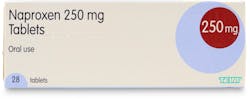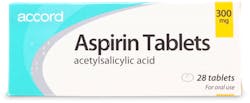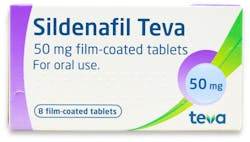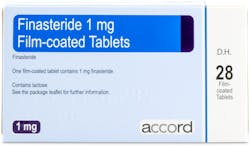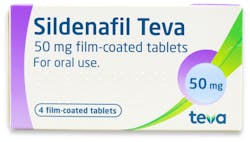Naproxen Period Pain Teva 250mg (PGD) 28 Tablets
Naproxen Period Pain Teva 250mg (PGD) 28 Tablets
What 500,000+ customers say about medino:
Get notified when back in stock
Description
If you experience painful periods, these tablets are effective to relieve pain before or during menstruation.
Benefits:
- Effective period pain relief
- Non-steroidal anti-inflammatory drug
- Relieves nighttime pain and morning stiffness
- Easy to take tablets
- Gets to work fast
- Helps to make periods easier to deal with
FAQ:
1. Is this an over-the-counter medication? No, this is a prescription-only medication (POM). But we do offer a private clinic (called PGD) where a trained pharmacist can dispense Naproxen 250mg Tablets after carrying out a clinical assessment.
2. What will happen once I have answered the questions in the form? A pharmacist trained to provide this period pain private service will assess the form and call you to discuss with you the answers you provided.
3. Why do I need to provide my phone number? In order to dispense this medication without a prescription, the consultation must be carried out via phone or video call. As well as this being a legal requirement to ensure that the medication is suitable for you, the final phone consultation will allow you to ask the pharmacist any questions you may have.
4. Is the consultation private? Patient confidentiality is one of our top priorities, both the form you fill and the phone consultation are strictly confidential between you and the pharmacist.
5. Do I need to pay for the consultation? The price you see is inclusive of the consultation fee, so you will not have to pay anything extra and there are no hidden fees.
Ingredients
Active ingredient: Naproxen 250mg
Also contains lactose.
Usage and Instructions
On the first day TWO tablets (500 mg) should be taken initially and then ONE tablet (250 mg) after 6 to 8 hours if needed. On the second and third day, if required, ONE tablet (250mg) should be taken every 6 to 8 hours. Not more than 3 tablets to be taken per day and for no longer than 3 days
Warnings
Women between 16 and 50 years old:
Take this medication with or after food, swallowed whole with water. Tablets should not be broken or crushed.
On the first day take 2 tablets (500mg) and then one tablet (250mg) after 6 to 8 hours, only if needed.
On the second and third day, if needed, take one tablet (250mg) every 6 to 8 hours.
Not more than 3 tablets to be taken per day.
The maximum duration of continuous treatment in any one cycle (period) is 3 days.
If symptoms are persistent and do not respond to the initial treatment please consult your GP.
Who cannot take Naproxen 250mg Tablets?
• If you are a man
• If you are under 16 years of age or over 50 years of age
• If your symptoms are severe
• If allergic to naproxen, naproxen sodium formulations or any of the excipients
• If you are pregnant or think you might be pregnant
• If you are breastfeeding
• If you currently have or have had peptic ulceration and active gastrointestinal bleeding
• If you have experienced bleeding or perforation, related to previous NSAIDs therapy with ibuprofen, naproxen, aspirin or similar medications)
• If aspirin, ibuprofen or other non-steroidal anti inflammatory/analgesic drugs induce the syndrome of asthma, rhinitis, nasal polyps, angioedema, urticaria or other hypersensitivity reactions
• If you have congestive heart failure, established ischaemic heart disease, peripheral arterial disease, and/or cerebrovascular disease
• If you have liver or kidney problems
• If you have any cardiac impairment
• If you have moderate or severe hypertension
• If you have mild uncontrolled hypertension
• If you have a history of gastro-intestinal disease
• If you have a rare hereditary problems of galactose intolerance, the Lapp lactase deficiency or glucose-galactose malabsorption
• If you have difficulties conceiving, are undergoing investigation of fertility or are attempting to conceive
• If you first experienced period pain more than a year after starting menstruation
• If you have or think you might have a sexually transmitted infection
• If your period pain is caused by something else (i.g endometriosis)
• If you have any coagulation disorders
• If you are at high risk of bleeding
• If you are taking any of the following medications:
̵ Naproxen-containing products
̵ Oral corticosteroids
̵ Anticoagulants or other coumarin derivatives
̵ Heparin
̵ Selective serotonin-reuptake inhibitors or anti-platelet agents
̵ Other NSAIDs including (e.g. ibuprofen, cyclooxygenase-2 selective inhibitors, aspirin)
Side Effects
As for all medication, Naproxen can cause side effect. Undesirable effects may be minimised by using the lowest effective dose for the shortest duration necessary to control symptoms. If you are treated with NSAIDs long-term, you should undergo regular medical supervision to monitor for adverse events:
- Severe hepatic reactions, including jaundice and hepatitis
- Naproxen decreases platelet aggregation and prolongs bleeding time
- Exacerbation of bronchospasm, asthma or allergic desease
- Kidney toxicity
- Fluid retention, hypertension and oedema
- Increase in blood pressure
- Gastrointestinal (GI) bleeding that can often manifest as really dark, black stools.
If you experience anny of the above symtpoms, stop taking the medication and seek immediate medical advice.
